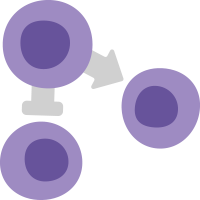
Immune Regulation News
Immune Regulation News is an online resource covering research into the regulation, suppression, and modulation of the immune system.
The Immunoglobulin Superfamily Ligand B7H6 Subjects T Cell Responses to NK Cell Surveillance
[Science Immunology] By screening for mediators of natural killer (NK) cell recognition on T cells, investigators identified the immunoglobulin superfamily ligand B7H6 to be highly expressed by activated T cells, including patient-infused CD19-targeting chimeric antigen receptor (CAR) T cells.
Thymocyte Migration and Emigration
[Immunology Letters] Investigators review the contribution of the key factors mentioned above for the localization, migration and emigration of thymocytes.
Traverse Biotech Awarded Phase I SBIR Grant by the National Institute of Allergy and Infectious Diseases for Development of Innate Immune Stimulator
[Traverse Biotech, Inc. (PR Newswire)] Traverse Biotech, Inc. has been awarded a Phase I Small Business Innovation Research grant from the National Institute of Allergy and Infectious Diseases, part of the NIH.
ABBV-319: A CD19-Targeting Glucocorticoid Receptor Modulator Antibody-Drug Conjugate Therapy for B Cell Malignancies
[Blood] ABBV-319 elicited potent glucocorticoid receptor modulator-driven anti-tumor activity against multiple malignant B cell lines in vitro as well as in cell line-derived xenografts and patient-derived xenografts in vivo.
Metabolic Reprogramming of Tumor-Associated Macrophages Using Glutamine Antagonist JHU083 Drives Tumor Immunity in Myeloid-Rich Prostate and Bladder Cancer Tumors
[Cancer Immunology Research] Scientists showed JHU083-mediated glutamine antagonism in tumor microenvironments induced TNF, pro-inflammatory, and mTORC1 signaling in intratumoral tumor-associated macrophages clusters.
ALOX15+ M2 Macrophages Contribute to Epithelial Remodeling in Eosinophilic Chronic Rhinosinusitis With Nasal Polyps
[Journal Of Allergy And Clinical Immunology] Researchers investigated the role of ALOX15+ M2 macrophages in the epithelial remodeling of eosinophilic chronic rhinosinusitis with nasal polyps (eCRSwNP). Digital spatial transcriptome and single-cell sequencing analyses were used to characterize the epithelial remodeling and cellular infiltrate in eCRSwNP.
Allergen Immunotherapy: The Evidence Supporting the Efficacy and Safety of Subcutaneous Immunotherapy and Sublingual Forms of Immunotherapy for Allergic Rhinitis/Conjunctivitis and Asthma
[Journal Of Allergy And Clinical Immunology-In Practice] The authors review the evidence-based literature supporting the use of these forms of allergen immunotherapy (AIT), as well as focus on several current controversies and gaps in our knowledge base that have relevance for the appropriate selection of patients for treatment with specific AIT.
CPT-11 Mitigates Autoimmune Diseases by Suppressing Effector T Cells Without Affecting Long-Term Anti-Tumor Immunity
[Cell Death Discovery] Researchers showed that CPT-11 suppresses T cell proliferation and pro-inflammatory cytokine production in healthy C57BL/6 mice and in complete Freund’s adjuvant-challenged mice.
Urban Indoor Gardening Enhances Immune Regulation and Diversifies Skin Microbiota – a Placebo-Controlled Double-Blinded Intervention Study
[Environment International] Investigators provided evidence in support of the core assumption of the hygiene and biodiversity hypotheses of immune-mediated diseases.
Allergen-Encapsulating Nanoparticles Reprogram Pathogenic Allergen-Specific Th2 Cells to Suppress Food Allergy
[Advanced Healthcare Materials] Scientists investigated the ability of allergen-encapsulating nanoparticles (NPs) to directly suppress pathogenic Th2 responses and reactivity in a mouse model of food allergy. NPs associated with pro-tolerogenic antigen-presenting cells, provoking the accumulation of suppressive regulatory T cells in the small intestine lamina propria.
Suppression of Lysosome Metabolism-Meditated GARP/TGF-β1 Complexes Specifically Depletes Regulatory T Cells to Inhibit Breast Cancer Metastasis
[Oncogene] Researchers demonstrated that tumour necrosis factor receptor-associated factor 3 interacting protein 3 (TRAF3IP3) in the Treg lysosome was involved in the activation mechanism of transforming growth factor-β1.
Treg-Derived Extracellular Vesicles: Roles in Diseases and Theranostics
[Molecular Pharmaceutics] The authors clarified the feasibility and potential of Treg-derived extracellular vesicles (Treg-EVs) in diseases and theranostics, facilitating further research and application of Treg-EVs.
For over a decade, Immune Regulation News has been keeping the scientific community up-to-date with the latest research and reviews related to immune regulation. Key research areas covered include the roles of regulatory T cells (Treg cells) in autoimmunity and self-reactivity, as well as immune response to disease, transplantation and cancer. We also provide vital updates on the latest jobs and upcoming events in the field of immunology.

 Cancer Stem Cell News
Cancer Stem Cell News Cell Therapy News
Cell Therapy News Dermal Cell News
Dermal Cell News Endothelial Cell News
Endothelial Cell News ESC & iPSC News
ESC & iPSC News Extracellular Matrix News
Extracellular Matrix News Hematopoiesis News
Hematopoiesis News Hepatic Cell News
Hepatic Cell News Human Immunology News
Human Immunology News Immune Regulation News
Immune Regulation News
 Intestinal Cell News
Intestinal Cell News Mammary Cell News
Mammary Cell News Mesenchymal Cell News
Mesenchymal Cell News Muscle Cell News
Muscle Cell News Neural Cell News
Neural Cell News Organoid News
Organoid News Pancreatic Cell News
Pancreatic Cell News Prostate Cell News
Prostate Cell News Pulmonary Cell News
Pulmonary Cell News
